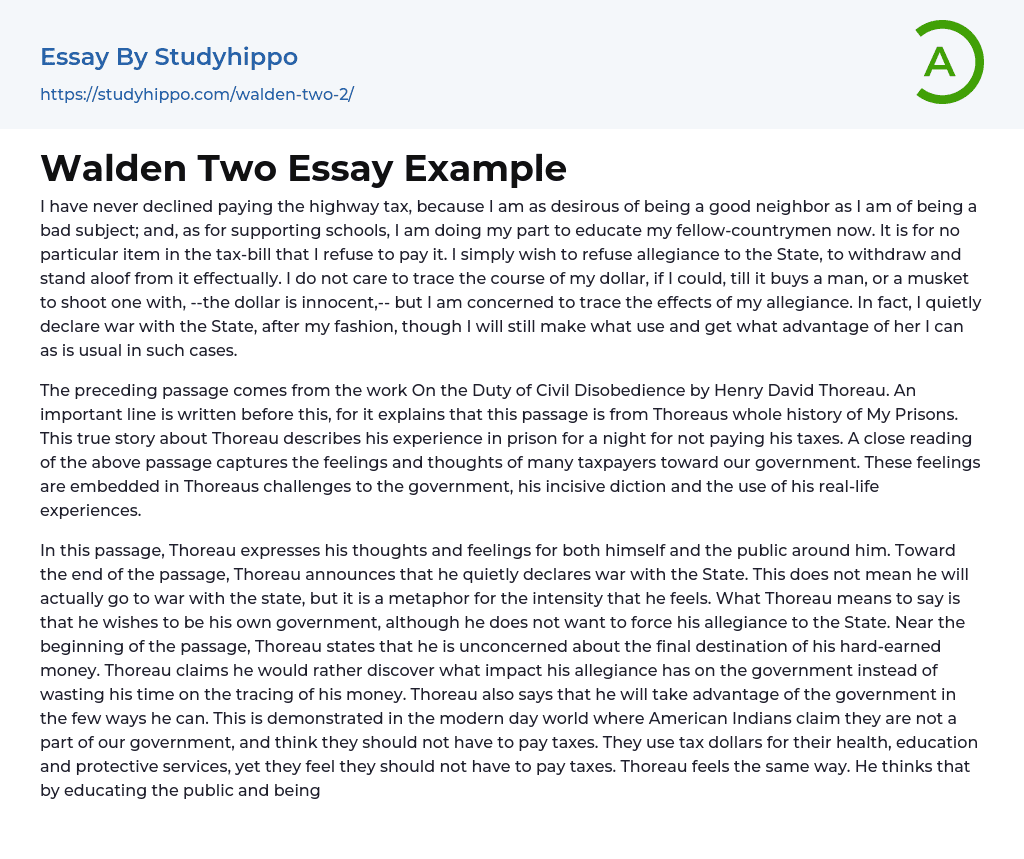Despite fulfilling my obligations as a responsible citizen and good neighbor by paying the highway tax, I have chosen not to pay this tax. This decision is not based on any specific item in the tax bill but rather on my desire to disassociate myself from the State and avoid any allegiance to it. While I do not concern myself with how my dollar is utilized, I am more interested in evaluating the consequences of my loyalty. In fact, I quietly oppose the State in my own way while still taking advantage of any benefits it offers - a common occurrence in such situations.
The preceding passage is an excerpt from Henry David Thoreau's On the Duty of Civil Disobedience. It is taken from Thoreau's personal account titled My Prisons, recounting his night in jail for refusing to pay taxes. Through a close analysis of this passage, one can understand
...the sentiments and thoughts shared by many taxpayers towards the government. These sentiments are expressed through Thoreau's challenges to the government, his choice of words, and his real-life experiences.
Within this passage, Thoreau expresses his thoughts and feelings both for himself and the society surrounding him. Towards the end, he metaphorically declares his quiet war against the State to emphasize the intensity of his emotions. However, it should be noted that this declaration does not imply a physical war but rather represents his desire to govern himself without forcing allegiance upon the State.
In the beginning of the passage,Thoreau states that he doesn't concern himself with where his hard-earned money goes. Instead of wasting time tracking its destination, he focuses on understanding how his loyalty affects the government.
Additionally, Thoreau acknowledges that he will utilize whatever limited opportunities are available to him to benefit from governmental services.
In today's world, American Indians argue that they are not part of the government and therefore should be exempt from paying taxes.Despite receiving tax-funded services for their health, education, and protection, some individuals still argue against contributing to taxes. Thoreau shares a similar viewpoint, asserting that he has already made valuable contributions to society through education and being a good neighbor. He believes that he should not be obligated to give up his money as he contributes through his knowledge and kind deeds. Thoreau's comprehensive perspective on taxation is evident in this passage, where his skillful use of language plays a vital role in conveying his ideas with carefully chosen words and sentence structures. One example is how he emphasizes the phrase "the dollar is innocent," highlighting the government's faulty philosophy rather than blaming the monetary system itself. The dashes used to separate this phrase further underscore its significance, making it stand out prominently within the overall passage like a flower amidst a barren desert. Thoreau's unique perspective shines through his strong diction, employing personal pronouns like "I" to assert ownership of his feelings and actions while leaving no room for alternative perspectives such as "you" or "we". By relying on facts instead of opinions and incorporating rhetorical questions, Thoreau encourages deeper contemplation among readers.Thoreau effectively conveys his views on government through skillful word choices, comparisons, and personal experiences. His use of comparisons, such as contrasting being a good neighbor with being a bad subject, enhances the persuasiveness of his rhetoric. Despite the potential penalties from the
government, Thoreau remains virtuous and stands up for his beliefs instead of getting involved in tax disputes. He employs vivid techniques that often go unnoticed, using concise statements rather than lengthy descriptions. Thoreau's passion for conveying his message through comparisons and personal experiences becomes evident upon careful examination of this passage. He criticizes the government and reveals his sentiment through his choice of words and reliance on real-life encounters.
Thoreau faces an uphill battle against the government but maximizes his limited power by aiming to convince others about the righteousness of his viewpoint on tax issues. He emphasizes solely negative aspects of our government to highlight the need for change. Thoreau also encourages readers to find deeper meaning in his words - standing up for what they believe in even if they are alone in doing so. By taking a stance, individuals can raise awareness among others about their surrounding world's current state of affairs.
No bibliography provided
- Anatomy and Physiology essays
- Addiction essays
- Biodegradation essays
- Dental Care essays
- Disease essays
- Disorders essays
- Health Care essays
- Intelligence Quotient essays
- Nutrition essays
- Olfaction essays
- Public Health essays
- Women's Health essays
- World health organization essays
- Cancer essays
- Infectious Disease essays
- Lung Cancer essays
- Neurology essays
- Physical Exercise essays
- Medicine essays
- Sex essays
- Inquiry essays
- Disability essays
- Poison essays
- Action Potential essays
- Nervous System essays
- Childbirth essays
- Puberty essays
- Blood essays
- Kidney essays
- Neuron essays
- Body essays
- Glucose essays
- Sense essays
- Heart essays
- Skeleton essays
- Human Physiology essays
- Eye essays
- Immune System essays
- Muscle essays
- Skin essays
- Brain essays
- Central Nervous System essays
- Human Skin Color essays
- Digestive System essays
- Common sense essays
- Respiration essays
- alcoholism essays
- Smoking essays
- Casino essays
- Tobacco essays




